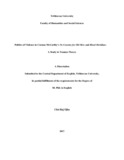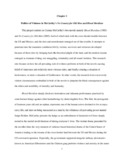Please use this identifier to cite or link to this item:
https://elibrary.tucl.edu.np/handle/123456789/2943Full metadata record
| DC Field | Value | Language |
|---|---|---|
| dc.contributor.author | Ojha, Chet Raj | |
| dc.date.accessioned | 2021-03-09T07:05:45Z | |
| dc.date.accessioned | 2021-07-23T04:23:34Z | - |
| dc.date.available | 2021-03-09T07:05:45Z | |
| dc.date.available | 2021-07-23T04:23:34Z | - |
| dc.date.issued | 2017 | |
| dc.identifier.uri | http://elibrary.tucl.edu.np/handle/123456789/2943 | - |
| dc.description.abstract | This research explores the questions of role of violence in the history with reference to the US-Mexico borderland in Cormac McCarthy’s Blood Meridian and No Country for Old Men. These two novels represent the American westward expansion and drug war in the late nineteenth century and at the turn of the present century. McCarthy brings together notions of wounds, presence of violence, opacity and incomprehensibility of reality, history and its belated consequences, betrayal of variety, and the notion of empathic unsettlement while unravelling the trauma arising from the violence. I present the thesis how both of the narratives exhibit varied facets of trauma faced by the people in different times but at the same setting and in the similar ways. After studying various analyses by critics on both of the narratives, including the researches in the light of trauma theory, I make my standpoint deviating from them and by drawing on the ideas of Cathy Caruth and Dominick LaCapra. The key argument is that as McCarthy writes back violence into the history of the South-western part of the USA, his capturing of the specificity of the trauma causes empathic unsettlement in the readers. | en_US |
| dc.language.iso | en_US | en_US |
| dc.subject | Politics | en_US |
| dc.subject | Violence | en_US |
| dc.title | Politics of Violence in Cormac McCarthy’s No Country for Old Men and Blood Meridian: A Study in Trauma Theory | en_US |
| dc.type | Thesis | en_US |
| Appears in Collections: | English | |
Files in This Item:
| File | Description | Size | Format | |
|---|---|---|---|---|
| Cover Page-2.pdf | 364.53 kB | Adobe PDF |  View/Open | |
| Chapter 1.pdf | 695.24 kB | Adobe PDF |  View/Open |
Items in DSpace are protected by copyright, with all rights reserved, unless otherwise indicated.
